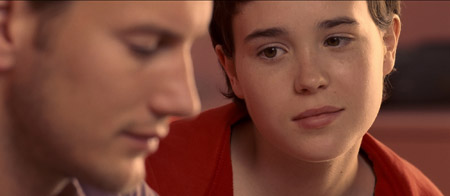Hard Candy
 Just before this movie started, my wife and I were having a conversation about, incidentally, the misogynistic violence in certain films of late, such as “Wolf Creek.” But just what is the biggest con in David Slade’s “Hard Candy?” It could be…
Just before this movie started, my wife and I were having a conversation about, incidentally, the misogynistic violence in certain films of late, such as “Wolf Creek.” But just what is the biggest con in David Slade’s “Hard Candy?” It could be…

in a scene from HARD CANDY. Photo credit: Mark Lowry
Just before this movie started, my wife and I were having a conversation about, incidentally, the misogynistic violence in certain films of late, such as “Wolf Creek.” But just what is the biggest con in David Slade’s “Hard Candy?” It could be Ellen Page who, as Hayley Stark, plays as convincing a precocious and deviously-intelligent fourteen-year old as you’ll ever see—she’s actually 19. My contention, however, is that the film itself is a con.
The opening credits inform us, among other things, that the production had a digital colorist. This is not uncommon for films these days, but the end result of the work here is rather obvious. When the director wants us to feel Hayley’s icy glaze of indifference, scenes are graded to a pale, desaturated green hue. When he wants us to feel Hayley’s rage, colors become oversaturated, cameras are jarred this way and that. Our perspective on matters is not only forced by isolating the story to an intended antagonist. There’s nothing improper with pointing out that Jeff Kohlver (Patrick Wilson) is a passive-aggressive predator of young girls. However, this fact is concealed purely so the story can have a falsely-inflated moment of revelation when (a-HA!) our prejudicial bias is ultimately vindicated. Slam-dunk. No thought patterns required.
Wouldn’t it be far more difficult to have left that question in the open? Slade clearly intends to be clever with a film as machined as this, right down to the way in which the camera lures us into viewing Haley as the justified protagonist right from the very beginning with its intimate close-ups of her face versus the distant and uneasy medium shots of Kohlver as he converses nervously with her. If Slade’s intent is so clever, then why is the film so stupid as to hamfist a two-hour anti-pedophilia public service announcement down the throats of an entire culture that, by and large, already agrees with the premise long before the film continues pummeling us with its refrain of mediocrity?
Not only is Hayley’s baiting, torture and, finally, her ultimatum self-interested to a sociopathic degree, but the film manipulates the viewer into confusing the difference between vengeance and justice. We’re steered to believe her actions arise more from antipathy, and less from psychotic vengeance, when we discover what Hayley actually does to him. Therefore, that reinforces our vision of Hayley as the hero who can do no wrong, for she has been wronged. Gandhi once said, “An eye for an eye leaves the whole world blind.” So in what forest does this film leave the audience wandering blindly? Is it, then, a joke when we see Hayley rolling down a hill and emerging innocuously in a red, hooded jacket, as the innocent Little Red Riding Hood? It’s a joke of the worst kind, because it means that the film has purposefully exploited one crime which we are, perhaps more than any other crime, predisposed to prejudicially convict the suspect without due process…. all for the sake of justifying another act of tremendous malice.
You will find few Americans who believe that Kohlver’s behavior—relentless and uninventive with his visible innuendos and pick-ups—is anything but, as Hayley states in one of many of her Diatribes of the Blindingly Obvious, a conscientious avulsion of a child from their rights. However, consider how emotionally-charged a crime this is. Even the mere accusation of child molestation is enough to convict an individual in the eyes of society at large, nevermind preponderance of evidence. So, I find the question that’s most interesting is the one that we aren’t given a chance to consider before the movie condescends to us in its lecturing tone, treating everyone in the audience as if we’re all child molesters in the making who need to be set straight. If Kohlver had been involved in no crime, we would be forced into the conflicting space between our human appetite for revenge and our rational sense of justice and jurisprudence.
 Hard Candy • Dolby® Digital surround sound in select theatres • Running Time: 103 minutes • MPAA Rating: R for disturbing violent and aberrant sexual content involving a teen, and for language.• Distributed by Lions Gate Films
Hard Candy • Dolby® Digital surround sound in select theatres • Running Time: 103 minutes • MPAA Rating: R for disturbing violent and aberrant sexual content involving a teen, and for language.• Distributed by Lions Gate Films